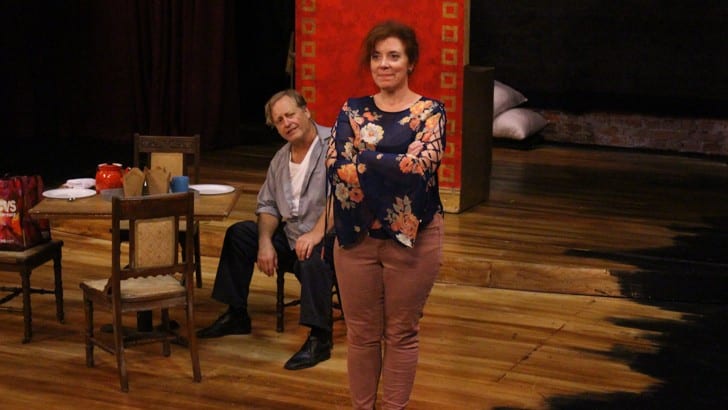
Gypsy arrives at the Lyric Stage
When it comes to staging a revival of what many consider to be the greatest American musical of all time, the one thing that plagues all productions of Gypsy is expectation. Most theater people know just how they like their Gypsy and just how Madame Rose—one of musical theater’s most enduring creations—should be played.
“I don’t know what you’re talking about,” joked Leigh Barrett, who stars as Rose in the Lyric Stage Company’s upcoming revival of Gypsy.
Rose has been played by so many greats that it can be a challenge for an actress to forget about those expectations and put her own stamp on the role. From Ethel Merman and Angela Lansbury to Bernadette Peters, Patti LuPone, Tyne Daly, and Bette Midler (the less that is said about Rosalind Russell, the better), there are more “definitive” Roses than Hamlets and King Lears combined.
But if anyone in Boston can put her own stamp on the role, it’s Barrett, one of Boston’s beloved dames of the stage. (She first played the role a decade ago at the Greater Boston Stage Company, which until very recently was called the Stoneham Theatre.) “What is the point of doing a show, even a show that everybody knows, if you don’t find your own voice in it?” said Barrett. “I’m not them—any of these people—and they are not me. Put on the CD or whatever the kids do these days, then you can hear them do it if that’s what you like.”
Director and choreographer Rachel Bertone, who is quickly making a name for herself around town as the go-to director for classic Broadway musicals, is all too aware of these expectations. “The first thing I said to the actors day one was that we have to strip ourselves of those expectations,” said Bertone.
It is the score—the glorious score by Jule Styne and Stephen Sondheim—that usually ignites such expectations, according to Bertone. “What is said often of the play is that this is a play with music, so we treated it like a play and often did the songs as monologues.”

Some of the musical numbers, though, when not given the right kind of treatment, can feel like they are impeding the action rather than moving it along (“If Momma Was Married” and “All I Need Is the Girl” being the two largest culprits). “Sometimes you need to fight against the music,” said Bertone. “It’s easy to sit in the music, but I’m like, ‘No, we have to tell the story.’ This is not a song-and-dance show—we’re not just going to kick our faces, we’re not just going to belt this.”
“But that is going to happen,” Barrett added with a smirk. “There is face kicking.”
For Bertone, it all comes down to the text. “Everything Arthur Laurents wrote was so specific and so intentional. Every day I would go through the script and find a new gold mine,” she said. “It’s one of the first musicals of the Golden Age that really understood how to seamlessly blend story, text, song, and dance. It’s beautifully written in that way if you just listen to what [Laurents] has done. It’s all there for you, so don’t resist it.”
Bertone, of course, is correct. Gypsy’s script is iron-clad and is generally thought of as the finest example of book writing in all of musical theater. There are other things, too, to consider when thinking about Gypsy’s significance in the grand scheme of things.
At the time that Gypsy opened on Broadway in 1959, the kind of leading ladies that Broadway was accustomed to were women like Nellie Forbush and Maria von Trapp who, while generally free thinking and strong willed, still fit squarely within the roles of their gender and ultimately sought the validation of a man. Rose—a venerable force of nature—was none of those things.
“It’s really the first time we’ve had a character that is this flawed,” said Bertone. “It’s literally a psychological study of a woman, a very strong woman. It’s totally, like, ‘Hey, we’re gonna deeply explore the fragility of the human psyche.’ What musical did that? Not to this point.”
“And not to this point have we ever had a strong female lead in this way,” added Barrett. “There’s vulnerability, of course, but in wearing the pants, that patriarchal role, it hadn’t happened.”
Rose does have a man in her life—Herbie, played in this production by the tremendous Steven Barkhimer—but even still, Bertone considers the dynamics of their relationship almost taboo for the time period. (Although Gypsy opened in 1959, it actually takes place in the 1920s and 30s.) “There’s this role reversal with Herbie and Rose, and it’s so unlike the time period,” said Bertone. “Rose isn’t married, and Rose is calling the shots. Herbie’s like, ‘When are you going to marry me?’ It’s a complete role reversal and I think it’s very powerful for the time period they’re in. Who is this unmarried woman who doesn’t want marriage and is fighting?”
It goes without saying that Rose’s complexities are what make her one of the most coveted roles for actresses of a certain age. But Rose’s strength is what can also make her a difficult pill for audiences to swallow: She’s loud, she’s direct, and she’s driven, but if her vulnerabilities don’t shine through, the show loses its soul; it’s the right mix of domination and torment that make for a home run. But it’s not easy.
“We have to root for Rose,” said Bertone. “We have to understand her and root for her. Leigh is so great about inhabiting a character and helping a character be understood. If you’re not hooked into Rose’s story by ‘Some People,’ it’s going to be a very long play.”
Barrett points to something that Patti LuPone said of Rose: “She can do monstrous things. She can make monstrous choices and be monstrous to people in her life, but that does not make her a monster. I feel like my job is to help people understand where that comes from and what drives that,” said Barrett. “Rachel is helping me strike that balance. You can’t start her at an 11 at 8 [o’clock] because where are you going to go?”
“I think that, throughout, you see glimmers of that vulnerability,” Barrett added. “But our Rose is not a barking steamroller from the get-go. I think that would be boring.”
GYPSY. 9.1–10.8 AT THE LYRIC STAGE COMPANY OF BOSTON, 140 CLARENDON ST., BOSTON.LYRICSTAGE.COM
Theater critic for TheaterMania & WBUR’s TheArtery | Theater Editor for DigBoston | film and music critic for EDGE Media | Boston Theater Critics Association.

